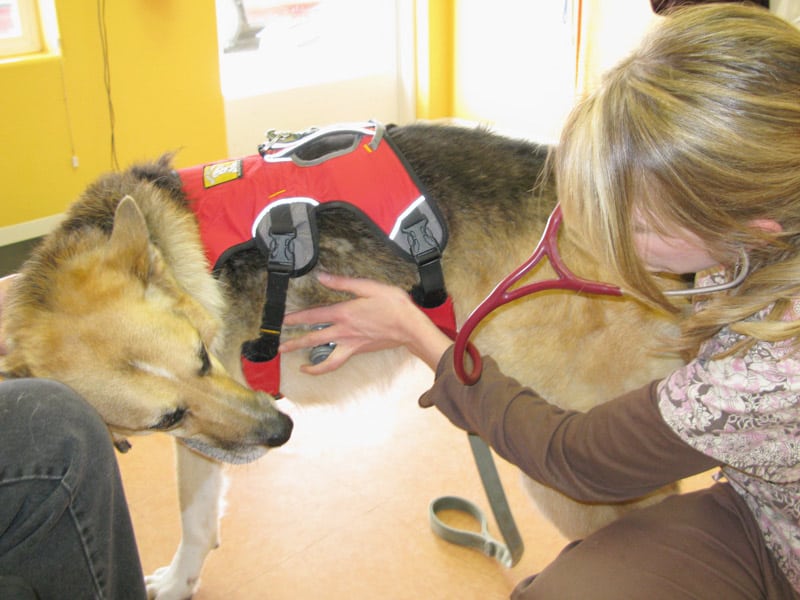Coping with amputation for your cat or dog is tough. When you’re also considering oncology treatment, it’s even harder to think straight when talking to your vet team. This list of 17 questions to ask your veterinary oncologist can help you have a better conversation to get the answers you need.
Why It’s Important to Get the FAQs from a Pet Cancer Veterinarian
When Tripawds Founder Jerry G. Dawg was diagnosed with bone cancer way back in 2006, we went into the situation being completely opposed to any kind of oncology care. We pictured him feeling and looking miserable. All we knew was how often humans suffer during treatment, and we didn’t want that for him.

But we had no idea that animals generally tolerate chemotherapy much better than humans!
We didn’t know much because we didn’t see an oncologist after his amputation. However, knowing what we know now, we would at least get the information from a cancer specialist so we could make a more confident and educated choice.
We did eventually see an oncologist,18 months later when his cancer returned and we wanted to make sure we left no stone unturned to help him beat it.
If your Tripawd has cancer and you can afford a veterinary oncologist consultation (generally in the $250 range), don’t hesitate!
Even if you think you don’t want to pursue treatment, at least get the information you need to feel good about your decision. We promise you will go through this journey feeling confident in your treatment choices, whatever they are.
A Checklist of What to Ask your Veterinary Oncologist About Cancer Treatment
For many years we have recommended The Dog Cancer Survival Guide. Even though it was written several years ago, overall it’s an evergreen tool that can help so much in your journey.
One of our favorite sections is a list of questions to ask your veterinary oncologist. Feline or canine, here’s an abbreviated version of the book’s list that you can take with you to your first consultation.
Questions to Ask About a Specific Treatment
Why are you recommending this treatment? What makes it right for my dog or cat’s treatment?
How long does treatment last? How many visits are required?
Can I stay with my pet during the treatment?
Is the treatment uncomfortable in any way for my pet?
What are the side-effects, and the odds they will happen? Do they ever require hospitalization?
How do pets normally feel after a session? In the days that follow? When do they feel normal again?
What do you expect to happen when treatment is over? What is the best possible outcome? What is the worst? How likely is either of these to happen?
If this treatment works, how much quality of life do you think it will gain us? How much time?
What percentage of pets respond well to the treatment? What does “well” look like?
What are the odds this treatment will not work?
Is there any special care I need to give after this treatment? Do I need to be home the rest of the day? The next?
Are there any foods, supplements or anything else to avoid before or after the treatment?
How much does the treatment cost? Is the cost mostly up front or spread out over time?
Are there comparable alternatives to what you are recommending?
Get to Know Your Vet Oncologist, Too
Finally, be sure to remember these three questions to ask your veterinary oncologist about their treatment philosophies. You’ll be working with them in a scary and stressful time.
What is your treatment approach? How do you feel about blending “holistic” care with conventional?
Can you help me with diet and pet cancer nutrition too?
How do you prefer clients communicate with you?
Don’t forget to ask good questions that help you get to know your potential vet teammate better. Dr. Sue Ettinger, co-author of The Dog Cancer Survival Guide, advises:
“You might pay close attention to both the words and body language the practitioner uses when sharing her philosophy. Her bias might be revealed in subtle ways. If she is privately thinking “those holistic guys are all quacks” or “Western medicine does more harm than good,” it’s important that you know it so you can proceed appropriately.”
Dr. Sue Ettinger, DVM Dip. ACVIM (Oncology)
Don’t be afraid of asking questions. Get the facts about pet cancer treatment options and then decide.
Knowledge is power! And when you can’t decide, or just want to chat with others who have been through amputation and cancer treatment, our community can help!
